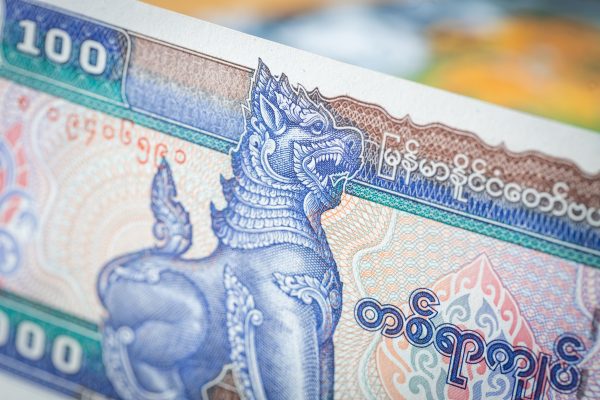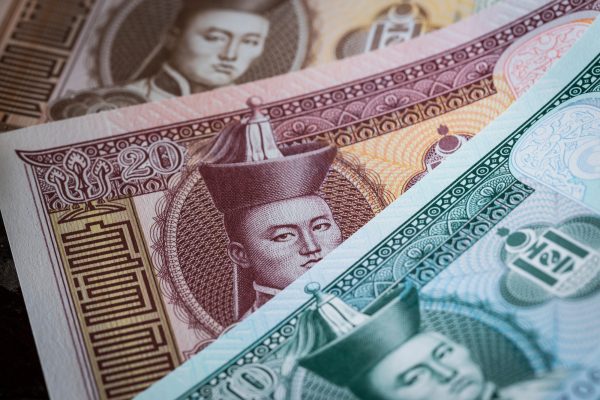Myanmar’s junta has launched a crackdown on illegal gold and foreign currency traders in a bid to stabilize the kyat currency, which fell to an all-time low late last month. According to a Reuters report that cited the state-run Global New Light of Myanmar, the junta authorities had arrested 14 people “for their involvement in destabilizing the foreign exchange market in the country.”
“The government is working towards the stability of the country and the rule of law,” the Myanmar state media report said. “Security organizations have taken action against businesspeople engaged in speculation to hinder the country’s economic development.”
The article in the Global New Light, which was sandwiched between reports on special economic zones and seed oil production in its Tuesday print edition, also included photos of 11 fugitives whom it said “were orchestrating activities to destabilize the foreign exchange market.”
The arrests are an attempt to reverse the precipitous slide in the value of the kyat since the February 2021 coup. Last week, the kyat hit a record low of 4,500 kyat to the U.S. dollar on the black market, Reuters reported, compared with around 1,300 at the time of the military takeover. Another source claimed that the black market rate fell to as low as 5,100 to the dollar in late May.
This came a day after 21 people were reportedly arrested for allegedly destabilizing gold prices. The Global New Light described those arrested as “unscrupulous persons who manipulated gold prices” in an attempt “to undermine economic development of the State and destabilize the State economy.”
The depreciation of the kyat, and the climbing cost of gold, are direct results of the political turmoil unleashed by the coup, which was followed by an armed struggle and violent crackdowns by the military junta, and disruption to critical services like telecommunications, banking, health, and education.
The economy contracted by nearly a fifth in 2021, the year of the coup, and is still 12 percent smaller now than it was prior to the military takeover and the COVID-19 pandemic. In this context, the Asian Development Bank’s projections of 1.2 percent GDP growth for 2024, and 2.2 percent for 2025, look decidedly optimistic.
The political and economic turmoil has prompted a mass flight into the safety of gold and the U.S. dollar, at the same time that supplies of these two currencies, particularly the latter, remain severely limited. The resulting mismatch between supply and demand has pushed up the cost of the dollar to dizzying heights.
The currency crisis has since worsened further as opponents of the military junta have seized large swathes of territory in the country’s periphery, including several of the country’s most important border crossings and overland trade routes into China, Bangladesh, and India. The kyat has lost 16 percent of its value in the first quarter of 2024 alone, while the price of gold has risen by more than a fifth.
It is likely that those arrested in the crackdown – most of them listed in the Global New Light as “illegal foreign currency sellers” – were simply seeking personal advantage rather than waging a campaign of economic sabotage against the junta. The massive gulf between the reference rate for the kyat, which the Myanmar Central Bank has set at around 2,100 kyat per dollar, has opened up obvious opportunities for arbitrage – for buying kyats at the black market rate and then cashing them into U.S. dollars at the official rate for a handy – if risk-laden – profit.
This is not the first time the military State Administration Council (SAC) has taken action against foreign exchange agents. In April 2022, it introduced a policy stating that foreign exchange earned by locals in Myanmar must be deposited in accounts at licensed banks and exchanged for kyats within one working day. The following month, the Central Bank also ordered ministries and other government agencies to cease using foreign currencies for domestic transactions. Then, last August, as the kyat fell to around 3,900 to the U.S. dollar, the junta threatened legal action against anyone found to be in possession of foreign currency without the proper authorization. All this time, it has also sold off large amounts of dollars in an attempt to prop up the value of the kyat.
The fact that these measures have failed is an alarming sign for the SAC, as is the fact that it now feels the need to resort to coercion to prevent the value of the kyat from declining further. As one local banking expert told Radio Free Asia last year, this approach is unlikely to work.
“The U.S. dollar exchange rate is going to rise as its demand is much higher than its supply,” the expert said. “There is no way to stop it. You can’t stop it by issuing orders, nor by threats of arrest.”
In an April article for Radio Free Asia, Zachary Abuza of the National War College argued that the economic decline could conceivably degrade the military’s ability to fight the broad-based resistance to its rule. “While manpower issues have led to forced conscription, no less important is whether the regime is able to financially sustain its military operations,” he wrote.




















Discussion about this post